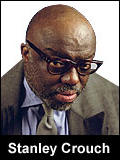
New York Daily News - Ideas & Opinions - Stanley Crouch: Road less traveledRoad less traveled
John Johnson broke new ground
with positive portrayals of blacks
When John Johnson, who died Monday at 87, began publishing his highly influential magazines, ethnicity was not the commodity that it is now. The obstacles were many, and it was very hard to sell something of quality if it came from a Negro. It also was not yet as easy to sell black pornography and black bathroom humor.
America was a very different nation.
To truly understand what a big deal it was that this grandson of slaves became a millionaire by building a magazine empire, we need to look a little closer at how things were in 1942. That's when Johnson published his first magazine, Negro Digest.
There were no movie stars of the sort we now have, there had been no Academy Awards for parts beyond maids, the armed forces were segregated and so was baseball. So were the states below the Mason-Dixon line. One would have been run out of the world for predicting that a Negro woman with blue eyes and blond hair would become Miss America, then have her crown taken away after nude pictures from her past were published in a pornographic magazine.
Skeptical looks would meet the prediction that the descendant of West Indian immigrants would one day be the chairman of the Joint Chiefs of Staff.
The laughter would have burst one's eardrums if he said that black men like Dick Parsons and Ken Chenault would sit as economic generals at the top of two of America's most powerful corporations.
John Johnson had a particular dream, which he pushed most strongly in Ebony, his black version of Life magazine. Johnson was at war with the stereotypes that racists used to justify the biases that dominated black and white relations.
Johnson's philosophy was simple. He said that his intention was to "show not only the Negroes but also white people that Negroes got married, had beauty contests, gave parties, ran successful businesses and did all the other normal things of life."
Johnson was able to get famous black people to write articles, like the one Louis Armstrong did in the early '50s, explaining "why I like dark-skinned women."
But Johnson, while always a supporter of civil rights, also knew how to shrewdly adjust to the "black is beautiful" times and Negro Digest, which was modeled on Reader's Digest, was renamed Black World before it went out of business and, to address the publishing convention of black always being lowercase, his publications always capitalized both black and white when they were meant to identify ethnicity. That policy continues today.
John Johnson was a businessman, but he also was what was once called "a race man." He was only interested in the ethnic market, and could not be tempted into competing with other magazines.
In terms of the long march that Negroes endured from poverty and exclusion to a healthy middle class and black men and women in unprecedented positions of influence, Johnson kept his eye on the prize and lifted into view every black man and woman worthy of attention.
In the past few decades, Jet, his weekly, covered anyone who made or spent big money. What began as a noble purpose settled for being in perfect keeping with a society in which the crudest visions of materialism are elevated across the board. In that way, Johnson succumbed to the decadence that is now as much a burden of his community as racism once was. Such is the blues of American life.
Originally published on August 11, 2005
No comments:
Post a Comment